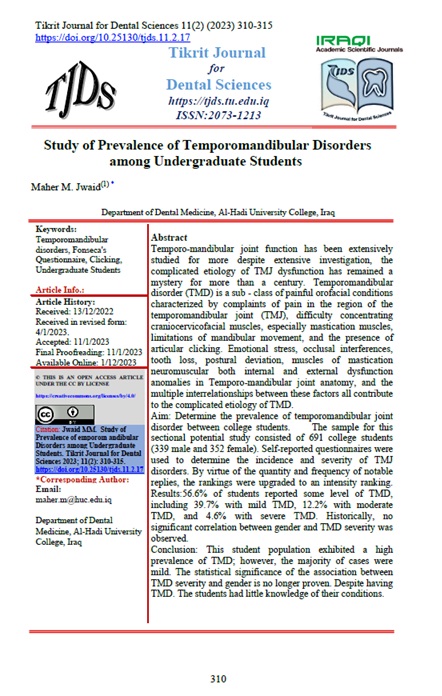Study of Prevalence of Temporomandibular Disorders among Undergraduate Students
Maher M. Jwaid
Department of Dental Medicine, Al-Hadi University College, Iraq
DOI: https://doi.org/10.25130/tjds.11.2.17
Keywords: Temporomandibular disorders, Fonseca's Questionnaire, Clicking, Undergraduate Students
Abstract
Temporo-mandibular joint function has been extensively studied for more despite extensive investigation, the complicated etiology of TMJ dysfunction has remained a mystery for more than a century. Temporomandibular disorder (TMD) is a sub - class of painful orofacial conditions characterized by complaints of pain in the region of the temporomandibular joint (TMJ), difficulty concentrating craniocervicofacial muscles, especially mastication muscles, limitations of mandibular movement, and the presence of articular clicking. Emotional stress, occlusal interferences, tooth loss, postural deviation, muscles of mastication neuromuscular both internal and external dysfunction anomalies in Temporo-mandibular joint anatomy, and the multiple interrelationships between these factors all contribute to the complicated etiology of TMD.
Aim: Determine the prevalence of temporomandibular joint disorder between college students. The sample for this sectional potential study consisted of 691 college students (339 male and 352 female). Self-reported questionnaires were used to determine the incidence and severity of TMJ disorders. By virtue of the quantity and frequency of notable replies, the rankings were upgraded to an intensity ranking. Results:56.6% of students reported some level of TMD, including 39.7% with mild TMD, 12.2% with moderate TMD, and 4.6% with severe TMD. Historically, no significant correlation between gender and TMD severity was observed.
Conclusion: This student population exhibited a high prevalence of TMD; however, the majority of cases were mild. The statistical significance of the association between TMD severity and gender is no longer proven. Despite having TMD. The students had little knowledge of their conditions.




